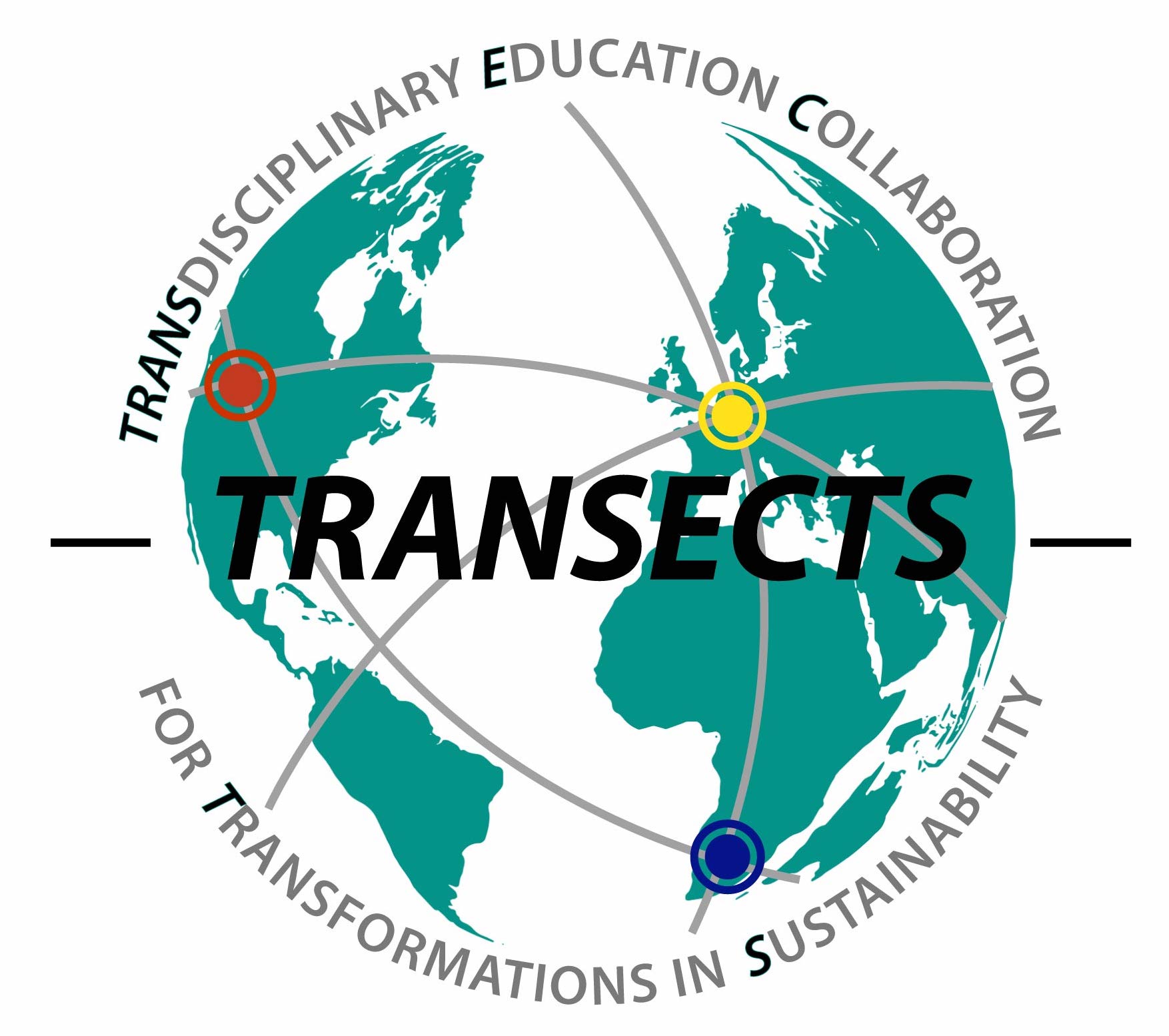What is TRANSECTS?
Our goal is to empower emerging scholars, professionals, and practitioners to become sustainability change makers through innovative and flexible intercultural, educational pathways.
We will
- catalyze societal engagement and research impact by designing innovative, lasting, flexible, training strategies suitable for cross-cultural learning within and across the Global South and North;
- nurture personal and community well-being through collaborations and a community of practice that embolden transdisciplinary scholars and practitioners; and
- re-imagine academic rigour and excellence by piloting and evaluating new metrics and institutional policies to support and recognize the success of transdisciplinary scholars.
TRANSECTS is designed to co-create and share innovative teaching tools, reduce barriers to knowledge sharing between North and South, help participating universities cement long-term relationships for ongoing research, and provide multi-site evidence by which to advocate for institutional change.
Today’s students of sustainability science are tomorrow’s practitioners and scholars, leading and “aiding humanity in its transition towards sustainability”. We define sustainability as the reconciliation of ecological, economic, social and cultural imperatives to sustain the flourishing of people and planet. Sustainability challenges such as climate change, biodiversity loss, inequality, poverty, overconsumption, and water security, are insistent, interconnected, and unevenly experienced at global and local levels. Together, these challenges have shaped the articulation and measurement of progress towards the United Nations (UN) Sustainable Development Goals (SDGs).
Transdisciplinarity – an approach that brings together academic researchers and external partners to co-create new knowledge and practice - has been promoted as a means to address complex societal challenges such as those associated with the SDGs. Our team of outstanding, interdisciplinary and transdisciplinary (transD) scholars and practitioners from across three continents proposes an innovative research training partnership that reconfigures sustainability science education, prepares graduates to be the next generation of sustainability change makers, and offers unparalleled opportunities for intercultural learning through shared international experiences and comparative analysis across the Global North and South.
Our commitments include:
- Providing trainees with the skills and confidence to employ novel methodologies to catalyze transformational change through transdisciplinary research praxis
- Offering training that builds and hones skills in ethical and effective practices for collaborative research design, including knowledge co-production, and shared evaluation and learning
- Addressing personal and social well-being challenges of all TRANSECTS participants by building and modeling a supportive community of practice involving students, scholars, universities, practitioners, and policy partners
- Applying the lessons learned across TRANSECTS to advocate for institutional changes that embrace transdisciplinarity, including financial, logistical, and emotional incentives and supports; supervisory training; new program policies; and improved communication strategies
TRANSECTS offers a training portfolio with tailored options that includes:
- Experiential learning together
- Foundational course in transdisciplinary research philosophy and methods
- International learning labs in UNESCO Biosphere Reserves
- Annual program institute to share our learning
- Enhanced professional networks & mentoring
- Enhanced professional development and resource sharing
- Shared courses across institutions
- Micro-credentials and continuing education for all learners
- Resource platform to share good practices
RESEARCH TRAINING FOR ALL LEARNERS
Students of sustainability science face some of the world's most intractable problems, either as academics or practitioners. They must draw from multiple disciplines and ways of knowing to become proficient transdisciplinary professionals who engage effectively with collaborators and communities through all phases of their work -- from problem formulation to solution implementation. Hence, they must master diverse knowledge sets, methodological and relational competencies, and professional skills. Yet academic efforts to train students continue to neglect the human skills and professional tools necessary for transformative, transdisciplinary sustainability research and practice.
- TRANSECTS trainees will work in international, intercultural and biodiverse settings to gain crucial transdisciplinary competencies and professional skills; enhance their critical, relational, and reflexive capacities; and build their professional networks.
- TRANSECTS offers flexible and accessible pathways for training, professional development, mentorship and networking.
- Scholars and practitioners who seek to catalyze and guide transformative societal change for sustainability must demonstrate research excellence, societal engagement, attention to diverse worldviews, and a practice of care for personal and community well-being. TRANSECTS offers trainees unparalleled opportunities to work in international and intercultural settings, from the local to the global level, to address these requirements, providing graduates with competencies, skills, experiences, and professional networks to launch and excel in their professional careers.
- Together, we will build an inclusive community of practice that exemplifies Canada’s global leadership in transdisciplinary sustainability science training and its commitment to generating innovative solutions to urgent, global challenges. By the end of the project, a globally-networked cohort of emerging scholars and professionals will be applying the skills and competencies needed to fundamentally transform transdisciplinary sustainability research and practice in the coming decades.
PROMOTING INSTITUTIONAL CHANGE
Most university programs focus more on content and method knowledge than opportunities for relational skills development and effective communication necessary for locally-determined, ethical, co-engaged, and impactful research. We will provide explicit training that builds and hones skills in ethical and effective practices for collaborative research design, including knowledge co-production, and shared evaluation and learning.
The positions and profiles of our team members position us well to influence university policies and practices. We will apply the lessons learned across TRANSECTS to advocate for institutional changes that embrace transdisciplinarity, including financial, logistical, and wellness supports; supervisory training; new program policies; and improved communication strategies.
One of our commitments includes applying the lessons learned across TRANSECTS to advocate for institutional changes that embrace transdisciplinarity, including financial, logistical, and emotional incentives and supports; supervisory training; new program policies; and improved communication strategies.
